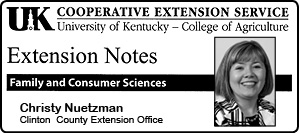Use national economic woes as an opportunity to examine the family budget

Source: Jennifer Hunter,
UK extension specialist for family financial management
Recent national and global economic news has been troubling, with significant long-term issues that contribute to financial uncertainty. While it’s important to remain aware of these issues, concern is better channeled into productive action on a more personal level, such as examining your family’s budget and making decisions that wisely use money.
As the nation discusses a long-term spending plan, that conversation provides an important reminder to review household spending. Developing a spending log is one of the first steps in establishing a household budget. Make a worksheet to track expenses for the next month. Write down any money you spend, regardless of payment type: cash, credit, debit or check. Once you know where your money goes, it will be easier to pinpoint the areas in which you overspend and develop a monthly budget.
We all know that skipping the expensive coffee shop beverage and bringing lunch to work are ways to save money. Go beyond those basics, and use this time to look deeper into your expenses to see what luxuries you can do without, and decide if you really want or need to forgo them. By examining personal spending now, when your concerns are heightened, you may find that your decisions, either for or against purchases, are clear and easy to make. Worry often provides clarity.
Other ways to spend money wisely include:
Choose expenditures that benefit both your family and the general economy. This may be the time to invest in energy-efficient appliances, upgrade the insulation in your home or install new windows and doors. Spend money on important upgrades that add value and/or increase comfort and energy efficiency.
Conserve gasoline. Gas prices are always a hot topic. Everyone groans when fuel costs rise, and conversations about the cheapest gas in town are common. Controlling your gas purchases requires planning, so map out your needs in advance to consolidate errands and reduce back-and-forth driving. Check to see if your employer offers car-pooling, and if it’s not an option, try to find neighbors, friends or colleagues with whom you can share rides, whether you car-pool for errands or work. Carpooling saves wear and tear on your vehicle, which over a year’s time, could lead to a slight reduction in car insurance if your mileage drops to meet your insurer’s criteria. Opting for the passenger’s seat also gives you an opportunity to read, catch up on conversations, practice a hand-held craft—or even get some shut-eye.
Minimize the impact of the back-to-school season. Those necessary yearly purchases quickly eat up discretionary income. Plan ahead, and, after reviewing your child’s list from school and inventorying last year’s supplies, list the items that are essential. Look at sale circulars from the major stores, who will be quite competitive with one another in an effort to attract additional foot traffic. Clip coupons and compare prices, which is particularly effective if you do your comparison shopping from home and save the gas money.
One last tip: If you can, wait to purchase items that are likely to go on clearance at the end of the retailer’s back-to-school cycle. Like Halloween candy and Christmas items, there will be deep discounts later in the season when the retailer needs to clear them out.
For more information, visit UK’s Moneywise website, http://www2.ca.uky.edu/moneywise/index.htm, or contact the Clinton County Cooperative Extension Service.
Educational programs of the Cooperative Extension Service serve all people regardless of race, color, sex, religion, disability or national origin.
